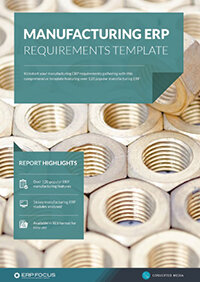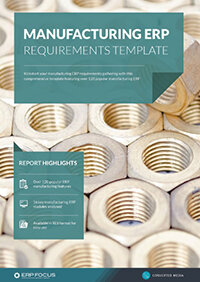Why a food specific ERP system is a must-have
Every business needs accounting, human resources, customer relationship management, and most enterprise requirement systems provide those tools. For food manufacturers, that list of requirements grows. There are regulatory requirements that you must comply with from managing recipes, organizing production schedules, all the way to preparing for the worst-case - food recalls. You need a food-specific ERP system.
Let’s look at some of the key features and requirements that you should be considering when searching for your food-specific ERP system.
Regulations your food ERP needs to comply with
In the United States, the Food and Drug Administration places many requirements on your business that are difficult to accomplish without a food-specific ERP. Many other nations place similar requirements on the food business through their governments.
The Food Safety Modernization Act 2011 gave the FDA new powers over the ways foods are grown, harvested, and processed. Some of the enhanced regulations relate to improving food traceability. Previous rules called for the ability to trace one step both upward and downward along the supply chain and those had many exemptions carved away.
Lot traceability for food manufacturers
The FDA is moving toward requiring food businesses to establish and maintain records containing key data elements associated with different critical tracking events. Critical tracking events listed are growing, receiving, creating, transforming, and shipping. Anyone subject to the FDA rules is required to maintain lot traceability program records for each food item they ship. Traceability lot records for each food would indicate where each food originated, was transformed, or created.
Those records can be paper or electronic. But the FDA requires that records must be presented within 24 hours of a request so electronic records are a requirement most companies should keep in mind. An FDA request might be to enable the FDA to deal with any outbreak, recall, or threat to public health therefore your food ERP system needs to be able to handle this functionality.
Food recalls
Regulations also deal with individual foods and traceability and potential recalls. But foods do not remain static, they are combined based on a recipe and then sold as a new product. Each food item within that recipe must be controlled and the product also managed as any ingredient might be subject to a recall.
Food businesses need their system to be able to handle and comply with regulations surrounding recalls. Food safety is paramount, your system should track all ingredients from start to finish, identify affected lot numbers, and provide complete visibility of your supply chain. Some food ERP systems even offer mock food recalls that allow companies to test their procedures during a recall.
Recipe management
Accurate inventory management and picking processes are part of a food ERP and ensure that the ingredient lot used in the recipe is known and properly recorded. Recipe management is much more than a defense against problems and recalls. Recipe management also enables unit of measurement conversions so that purchasing, receiving, storage, shipping, and selling units of measure can be easily converted throughout the processes.
Recipe management is also important for product labeling. This must accurately show the ingredients, nutritional information, and allergens in any size container sold to the public. ERP recipe management includes these capabilities and they are not simply the sum of those components of the ingredients as processing can change those measurements.
Batch management
Batch management allows a food business to maintain consistency across batches and locations. Keeping texture, taste, and smell the same helps build customer loyalty which is quite important. Food ERP also allows a business to store quality measurements for each product recipe and finished good item. Those quality measurements are actual results for batches as well as the standards against which those batches are measured.
The ERP also enables proportion management so that batches of different sizes yield consistent results. Often some ingredients require amounts that are not proportional to other ingredients while other ingredients are within the same proportion.
So, we see that ERP recipe management enables compliance to strict regulations and, at the same time, we can have good manufacturing schedules, cost management, and customer satisfaction.
Free white paper

Manufacturing ERP requirements template
Over 120 critical manufacturing ERP features in one downloadable spreadsheet

Related articles
-

ERP for Food Distributors: Key Functionality
In a modern world where products are tailored to consumers, why should ERP for food distributors ...
-

CMMC Compliance: What Aerospace and Defense Manufacturers Need to Know
Key insights on CMMC compliance, deadlines, and securing DoD contracts with CMMC 2.0 certificatio...
-

Process manufacturing ERP: formulas and recipes
Find out about the challenges your process manufacturing ERP will face when it comes to recipes a...

